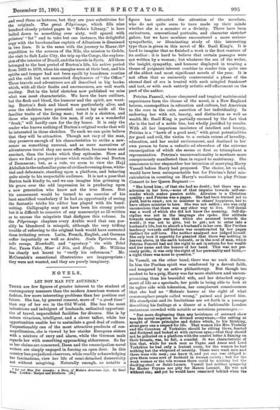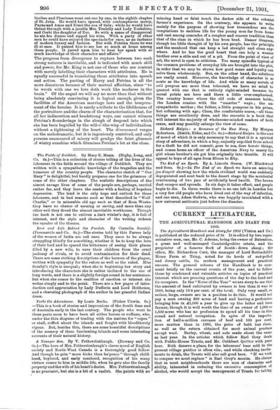NOVELS.
LET NOT MAN PUT ASUNDER.* THERE are few figures of greater interest to the student of contemporary manners than the modern American woman of fashion, few more interesting problems than her position and future. She has, by general consent, more of "a good time" than any of her sex in the Old World. She has the most industrious and indulgent of husbands, unlimited opportuni- ties of travel, unparalleled facilities for divorce. She is by nature vivacious, intelligent, and a clever talker, while her Opportunities enable her to assimilate a good deal of culture. Unquestionably one of the most attractive products of cos- mopolitanism, she is viewed by her staider European sisters with a mixture of envy and alarm, while the German male regards her with something approaching abhorrence. So far as her claims are concerned, Ibsen and the emancipation-novel Writers are simply engaged in forcing an open door. In this country less prejudiced observers, while readily acknowledging her fascinations, view her life of semi-detached domesticity not without misgiving. Naturally enough, so notable a
• Let not Man Pitt Assailer: a Story of Models American We. By Basil Zing. London: Harper and Brothers. Nil
figure has attracted the attention of the novelists, who do not quite seem to have made up their minds whether she is a monster or a divinity. There have been caricatures, conventional portraits, and character sketches
galore, but we have nowhere encountered a more serious, sympathetic, or illuminating study of this interesting
type than is given in this novel of Mr. Basil King's. It is hard to imagine that so finished a work is the first venture of its author : it is hard to believe that certain passages were not written by a woman; but whatever the sex of the writer, the insight, sympathy, and humour displayed in treating a
theme of poignant interest combine to render this quite one of the ablest and most significant novels of the year. It is
not often that so eminently controversial a phase of the eternal duel of sex is treated with such mingled frankness and tact, or with such entirely artistic self-effacement on the part of the author.
Petrina Faneuil, whose chequered and tragical matrimonial experiences form the theme of the novel, is a New England heiress, cosmopolitan in education and culture, but American to the core in the calm assertion of her individuality. In endowing her with wit, beauty, and distinction as well as wealth Mr. Basil King is partially excused by the fact that she is the last of a noble line, but wholly justified by results. With all her imperious insolence of intellect and beauty,
Petrina is a "hawk of a good nest," with great potentialities for good and evil, the victim to a certain extent of heredity,
education, and her social environment, and destined in her own person to form a reductio ad absurdum of the extreme
emancipation of which she seems at first so triumphant a representative. Petrina's unconventionality is nowhere more conspicuously manifested than in regard to matrimony. She announces to her stepmother her intention of marrying Harry Vassall before Harry had proposed. The choice, let us add,
would have been unimpeachable but for Petrina's fatal mis- calculation in counting on Harry's readiness to play Prince Consort to her Queen Regnant :—
"She loved him; of that she had no doubt; but there was no a:Atruism in her love,—none of that impulse towards self-Ear- render which makes passion noble. Altruism is a Christian quality ; and Petrina was a pagan. She had been trained not to yield, but to exact; not to minister to others' happiness, but to have others minister to hers. She was not selfish ; she was only unconscious that there was any other way to live. Self-denial was a word of which she did not know the meaning. Self-dis- cipline was not in the language she spoke. Her attitude towards marriage was that which she assumed towards the- world ; it was not to give, but to get ; not to enter into a husband's life, but to absorb a husband's in her own. Her Puritan. tendency towards self-torture was counteracted by her pagan instinct for self-love. She neither analysed nor judged herself. She only took it superbly for granted that there was nothing in. heaven above, in the earth beneath, or in the soul of man, which Petrina Faneuil had not the right to ask in return for her wealth and her name and the honour of her hand. This was not pre- cisely pride; it was only the right of her personality and birth,— a right there was none to question."
In Vassall, on the other hand, there was no such dualism.. In him the Puritan spirit was reinforced by a devout faith,
and tempered by an active philanthropy. But though too modest to be a prig, Harry was far more stubborn and uncom-
promising than his beautiful wife, and her detached enjoy- ment of life 813 a spectacle, her pride in being able to look at its uglier side with toleration, her complacent consciousness that she bad no "Hebraic horror at the sight of what
commonplace people called wrong," pained and jarred him. His standpoint and its limitations are set forth in a passage describing his feelings at a dinner at a fashionable London restaurant crowded with notable or notorious personages :—
" But more displeasing than any lavishness of outward show was the moral negation he divined everywhere,—the setting at naught of those principles and duties which, to his thinking, alone gave one a respect for life. That women like Mrs. Tredelly and the Countess of Yorkshire should be sitting there, feasted and flattered and looked at with envious eyes,—that they should not be pilloried on a platform with the scarlet letter A flaming on their breasts, was, he felt, a scandal. It was characteristic of him that, while for such men as Payne and Amos and Lord Yorkshire he had only a lenient scorn, for the women he had nothing but the whipcord of severity. There were weak men and there were vile men; one knew it, and yet oue was obliged to give them some sort of foothold in human society ; but for the weak woman or the vile woman there could be nothing but the ducking-stool or Saint-Lazare. Vassall had neither sympathy for Hester Prynne nor pity for Manon Lescaut. He was not without sin; and yet he would have remained behind when the
Scribes and Pharisees went out one by one, in the eighth chapter of St. John. He would have spared, with contemptuous mercy, Payne and Amos and Zimri the son of Salu ; while he would have thrust through with a javelin Mrs. Tredelly and Lady Yorkshire, and Cosbi the daughter of Zur. So with a sense of disapproval he ate his dinner and sipped his wine. With a party of other men he could have enjoyed the spectacle for once, as an instance of modern luxury and fashion. But with Petrina there he was ill at ease. It pained him to see her so much at home among these people. It jarred upon him to hear her speak with so much knowledge of their character and affairs."
The progress from divergence to rupture between two such strong natures is inevitable, and is indicated with much skill and power, for Mr. King is not one of those who are content with merely labelling their characters with attributes. He is equally successful in translating those attributes into speech and action. The parting of Harry and Petrina is all the more disastrous because of their mutual affection, since "to be wroth with one we love doth work like madness in the brain." Of the sequel we will say no more than that without being absolutely convincing it is logical enough, given the facilities of the American marriage laws and the tempera- ment of the heroine. It is surely a tribute to the lifelikeness of the portraiture and the charm of the characterisation that, for all her indiscretion and headstrong ways, one cannot witness
Petrina's flounderings in the slough of despond into which she has been beguiled by the will-o'-the-wisp of individualism without a tightening of the heart. The denouement verges
on the melodramatic, but it is ingeniously contrived, and only persons enamoured of misery will grudge the faint glimmer of wintry sunshine which illumines Petrina's lot at the close.











































 Previous page
Previous page